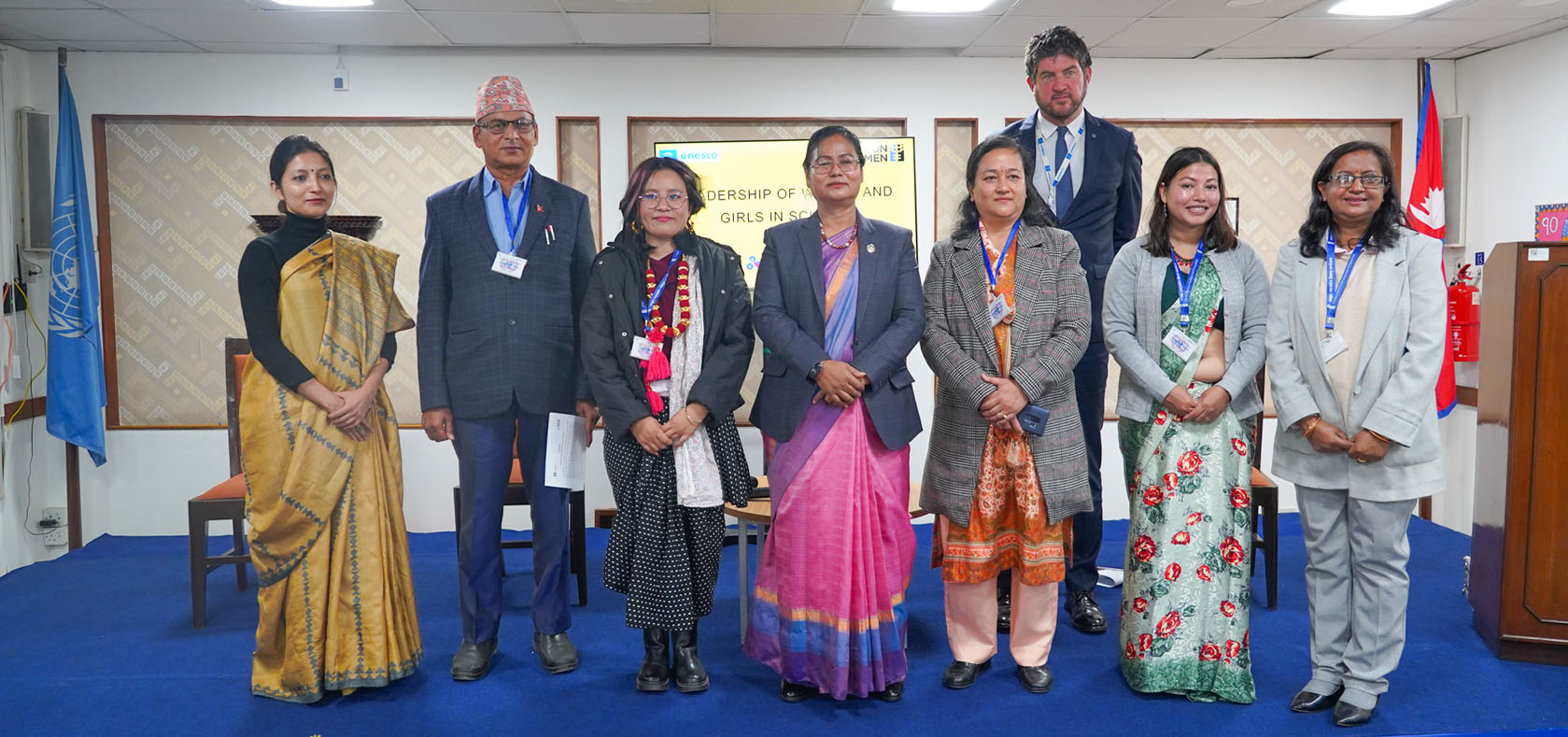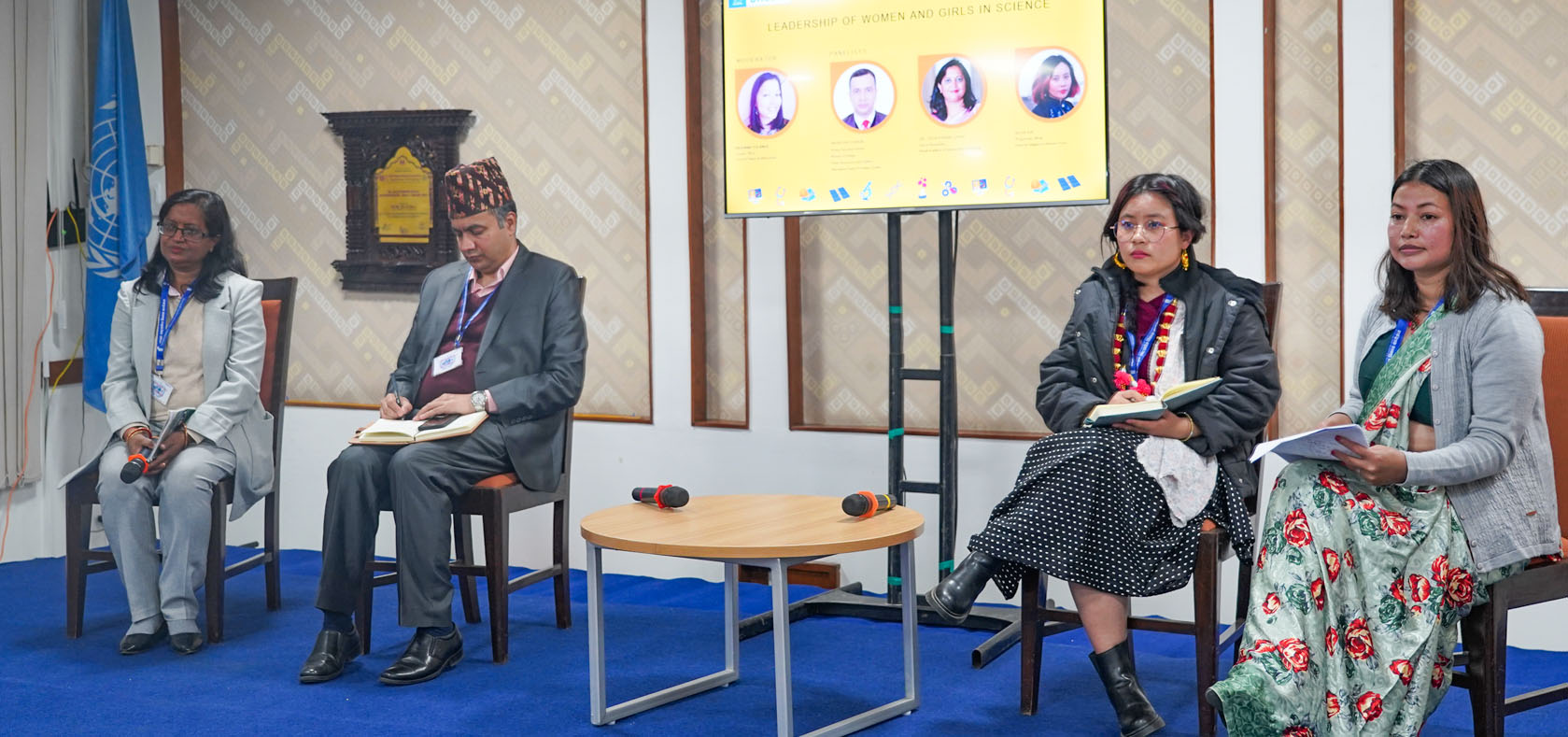Leadership of Women and Girls in Science
Date:
[Joint press release]

Kathmandu, Nepal — Scientists and researchers in Nepal have called for the equal participation and leadership of women and girls in science and technology to address the greatest challenges facing Nepal today.

UNESCO and the United Nations Entity for Gender Equality and the Empowerment of Women (UN Women) commemorated the 8th International Day for Women and Girls in Science, with a dialogue on, “Leadership of Women and Girls in Science”.
In Nepal, for every four men employed in professional, scientific and technical activities, there is only one woman. The lack of effective participation in STEM education and careers is not just a loss for women and girls, but a missed opportunity for communities, and nations to find sustainable solutions to common problems.
Speaking at the event, Honorable Minister of Women, Children and Senior Citizens Bhagwati Chaudhary shared, “If given the opportunity, women are likely to thrive. We need to ensure that we have at least 33 per cent representation of women in all sectors including government bodies, development agencies, political representation and private sectors. The government needs to incorporate this in the policies and ensure its implementation so that we have more women and girls in leadership.”
Navanita Sinha, Head of Office a.i. of UN Women Nepal shared, “I urge everyone to stand together, in our collective struggle to smash stereotypes, defy gender bias, and defeat discrimination that holds women and girls back in science.”
Michael Croft, the UNESCO Representative to Nepal added, “As we look around at our world, and see the discord and disharmony, we understand something is wrong, something is not in balance. We are missing the contribution and leadership of women and girls in so many areas, and science is no exception. Our sustainable development, our very future depends on what we do to promote and ensure the participation of women and girls in science.”

The panellists — Nawa Raj Dhakal, Acting Executive Director at Alternative Energy Promotion Centre, Ministry of Energy, Water Resources and Irrigation, Nuva Rai, Programme Officer at National Indigenous Women Forum, and Dr Tista Prasai Joshi, Senior Researcher at Nepal Academy of Science and Technology — called for action from the government, international development partners, and civil society to:
- Include more indigenous women and girls in research honoring the fact that indigenous women are repositories of knowledge on land, environment, and biodiversity.
- Increase investment for women and girls to pursue education in STEM.
- Break harmful gender norms prevalent within families, communities and formal structures that prevent women and girls from pursuing and leading careers in science and technology.
In her keynote remarks, Pramila Devi Bajracharya, Secretary of Science, Ministry of Education, Science and Technology emphasized that science and technology are the primary tools for prosperity in society and we need to amplify the voices and participation of women in STEM. Additionally, Rameshwor Prasad Yadav, Deputy Secretary General, Nepal National Commission for UNESCO stressed that social structures have prevented women from realizing their full potential- a woman can be anything, including a scientist, a social scientist, or a scientist at home in his closing remarks.
Gender equality and the empowerment of women and girls is crucial not only for economic development but also for meeting the 2030 Agenda for Sustainable Development.
For queries, please contact:
Barsha Lekhi
Tel: +977 15970180 Ext:47 | Email: b.lekhi@unesco.org
Subeksha Poudel
Tel: + 977 14290000, Ext: 1750 | Email: subeksha.poudel@unwomen.org
Editor’s Note:
The United Nations General Assembly adopted resolution 70/212 on 22 December 2015 and declared February 11 as the International Day of Women and Girls in Science. The resolution reaffirmed the importance of gender equality and women's participation in the policies, programmes and decision-making related to the Sustainable Development Goals. It further recognized the crucial role and contribution of women and girls in science, technology and innovations.